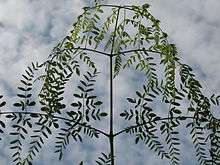Moringa drouhardii
| Moringa drouhardii | |
|---|---|
 | |
| Scientific classification | |
| Kingdom: | Plantae |
| (unranked): | Angiosperms |
| (unranked): | Eudicots |
| (unranked): | Rosids |
| Order: | Brassicales |
| Family: | Moringaceae |
| Genus: | Moringa |
| Species: | M. drouhardii |
| Binomial name | |
| Moringa drouhardii | |
The bottle tree, Moringa drouhardii, is an endemic species of southwest Madagascar. It occurs in the Madagascar spiny thickets ecoregion, especially at the limestone cliffs to the east of Lake Tsimanampetsotsa, on the Mahafaly Plateau.[1] The species is often planted in local villages and around traditional tombs. Neither the seeds (rich in edible oil and floculating proteins) nor the leaves (that can be eaten as green vegetables) are traditionally used in the Atsimo-Andrefana Region (southwestern Madagascar) despite their significant benefits.
References
- ↑ "Madagascar spiny thickets". Terrestrial Ecoregions. World Wildlife Fund.
| Wikimedia Commons has media related to Moringa drouhardii. |
Gallery
 14 October 2006
14 October 2006 27 December 2006
27 December 2006 19 May 2007
19 May 2007 19 May 2007
19 May 2007 19 September 2007
19 September 2007 6 June 2008
6 June 2008 28 November 2009
28 November 2009 23 January 2010
23 January 2010 5 June 2010
5 June 2010- M. drouhardii seeds: entire (left) and without shell (right)
- M. drouhardii seeds with cracked outer shells
This article is issued from Wikipedia - version of the 9/15/2015. The text is available under the Creative Commons Attribution/Share Alike but additional terms may apply for the media files.